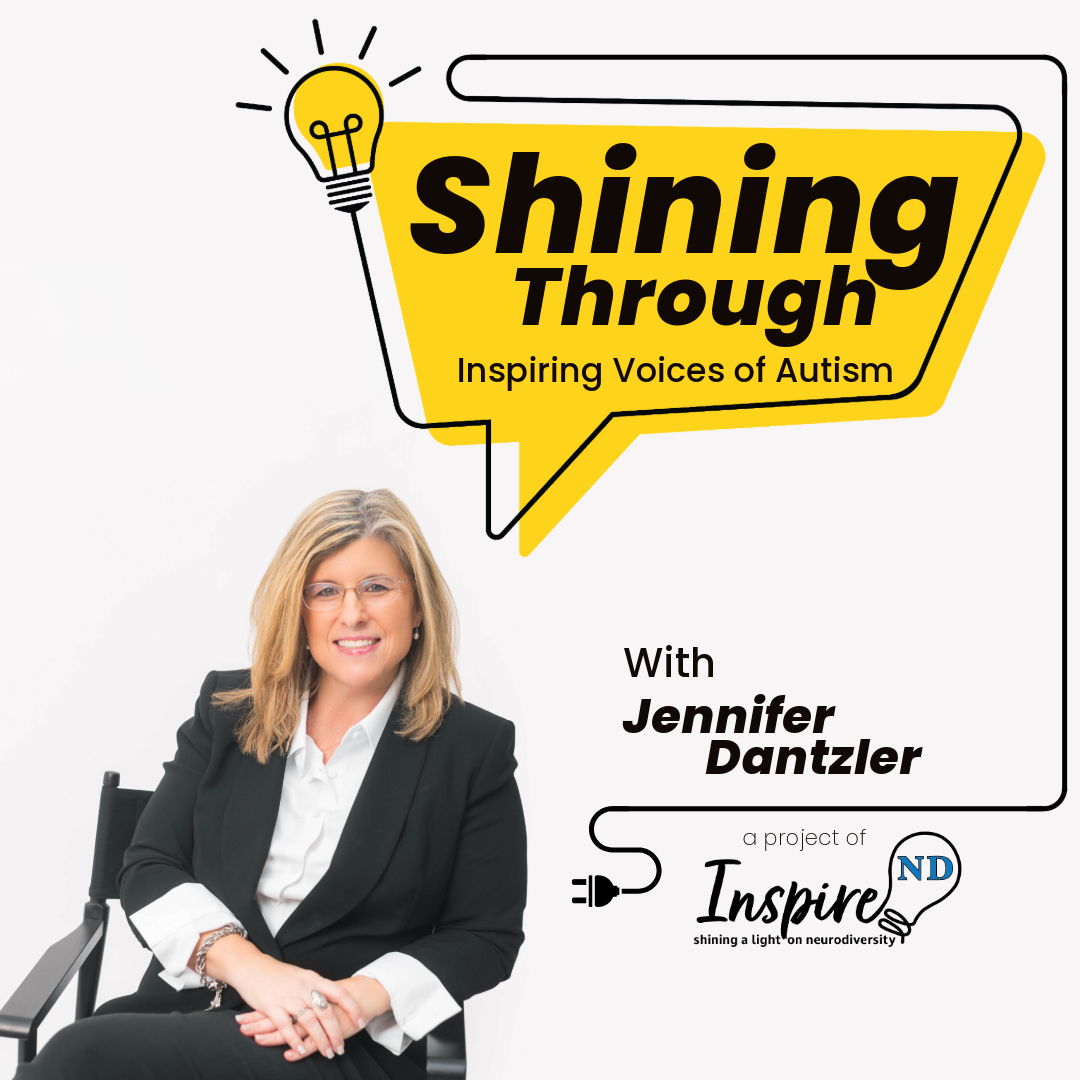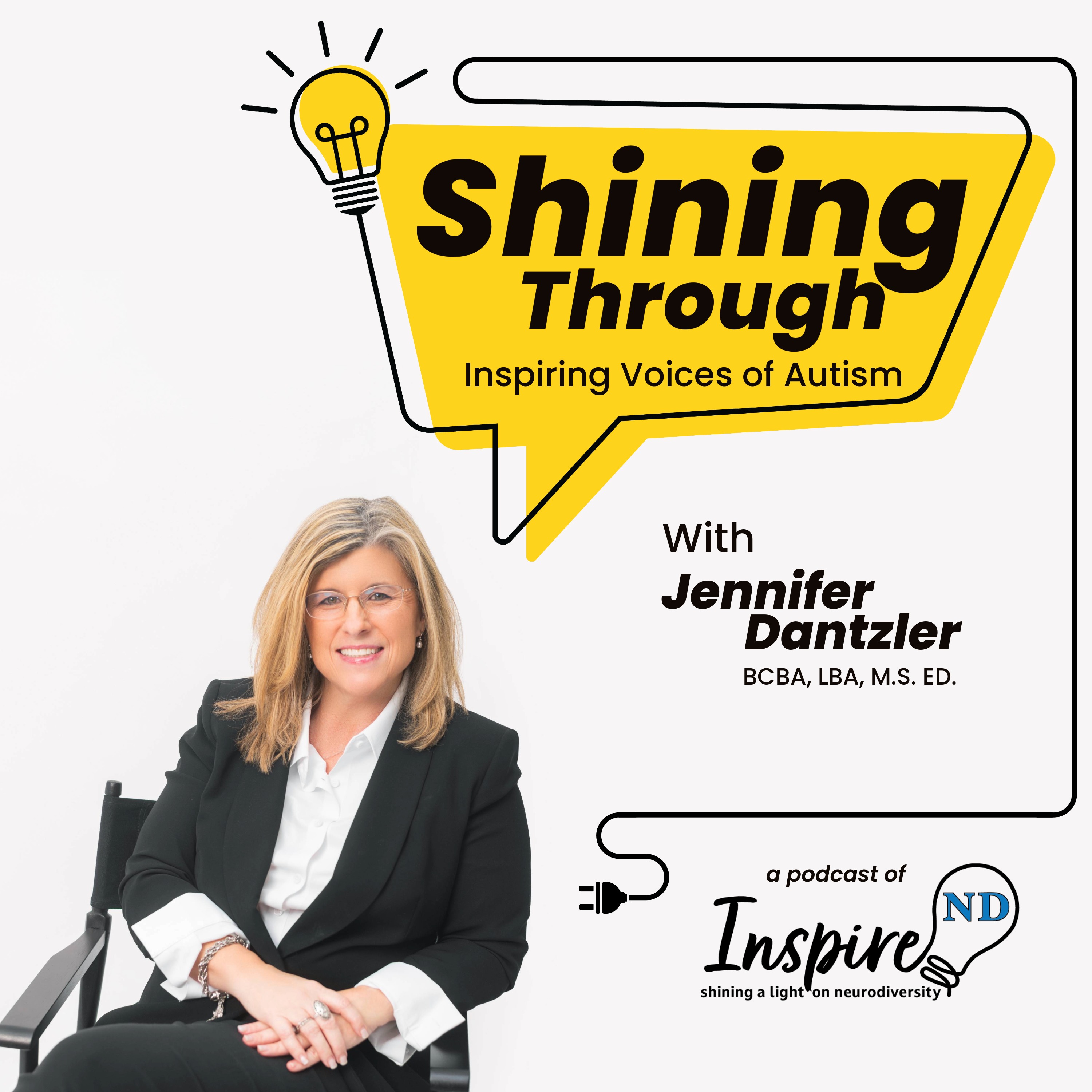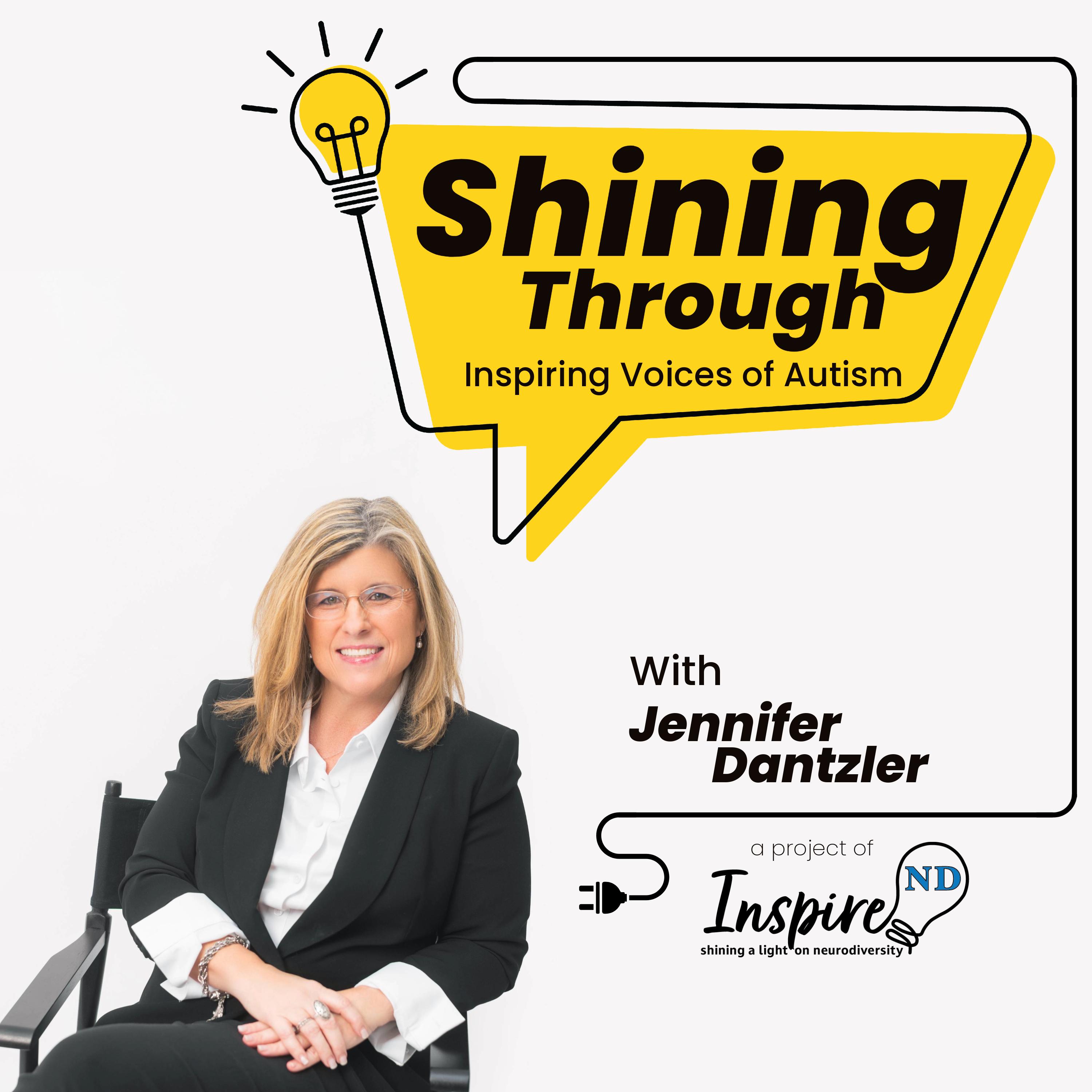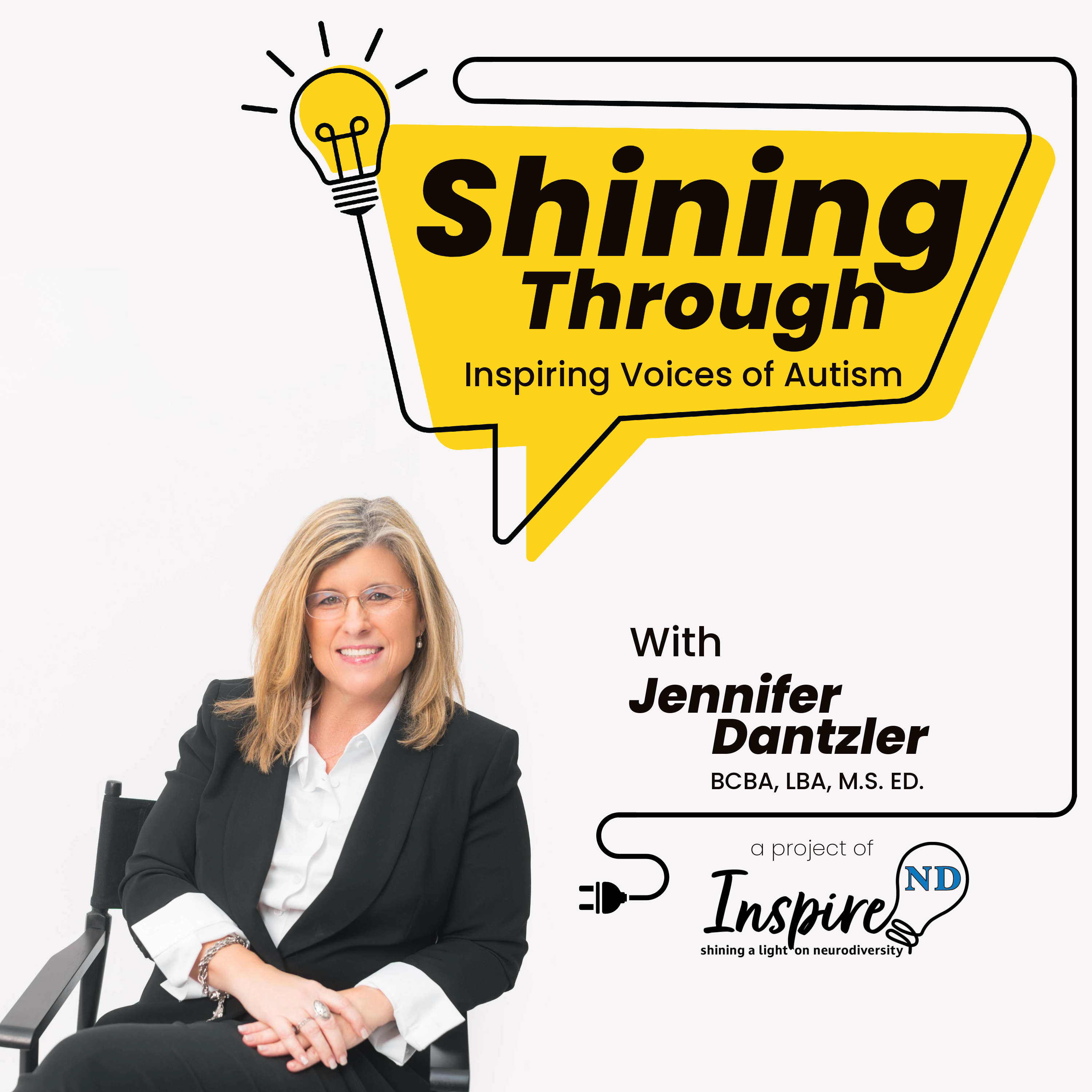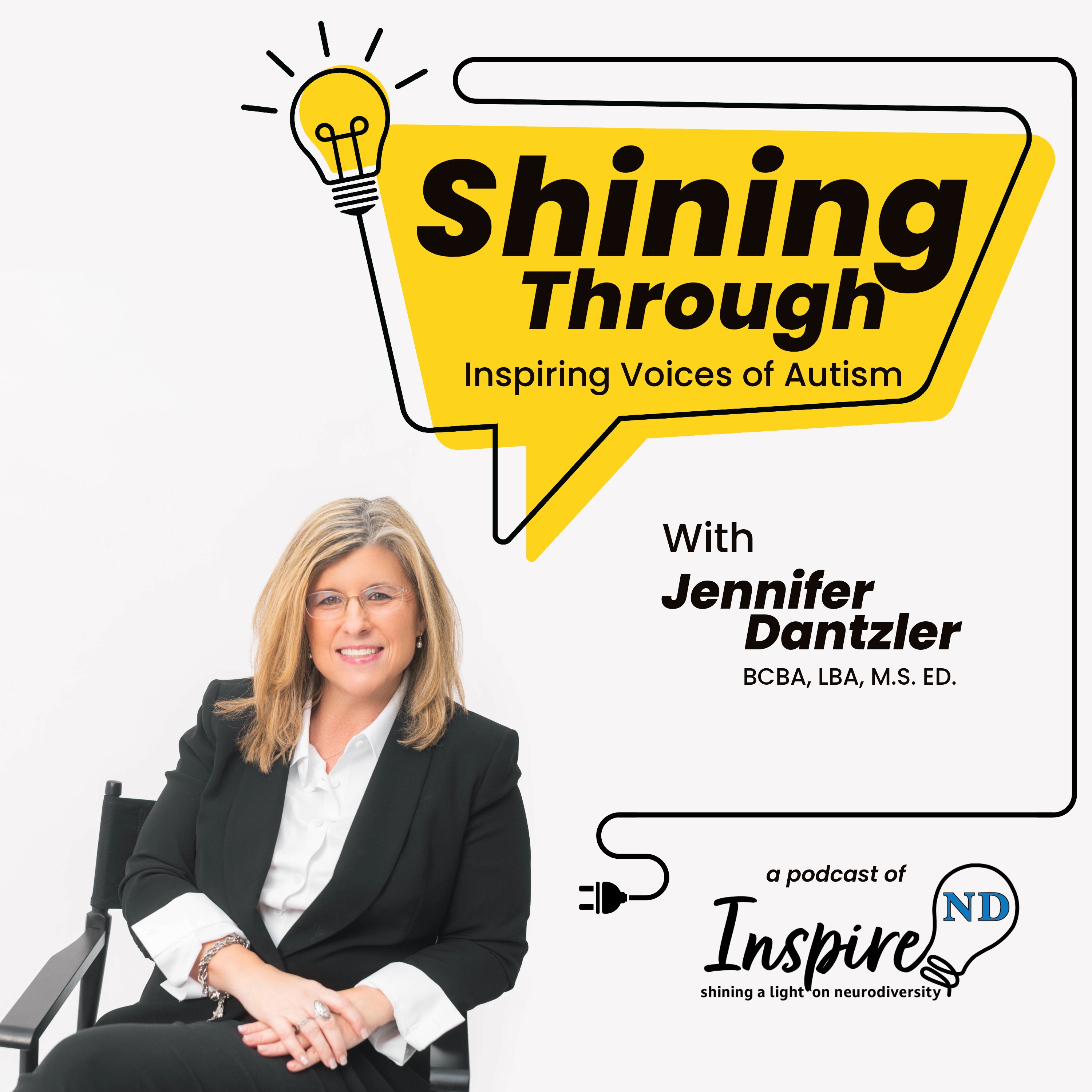[00:00:01] Speaker A: Welcome to Shining Inspiring Voices of Autism with show host Jennifer Dantzler. My name is Emily and I have autism. Thank you for taking the time to learn more about the world of autism. If you enjoy what you hear today, don't forget to follow this podcast.
[00:00:17] Speaker B: Hey everyone, this is Jennifer Dantzler and I'm the executive director and founder of inspirend, a nonprofit whose mission is to create truly inclusive communities through education and engagement. The goal of this podcast is to shine a light on real people and their stories in hopes of inspiring others who are on this journey of autism. Either themselves, their child, their loved one, their co worker. I truly believe ignorance is not bliss and we cannot be inclusive communities if we do not understand the people in the community.
With autism now affecting 1 in 31 people, we need to get louder about this topic. We recognize that autism is a spectrum. There are a lot of people with a lot of different needs, a lot of resources available or none available. And we know that in every episode we can't meet everyone's needs for their specific interests. However, we hope that in each episode you do gleam some kind of insight as to how you can help your child or yourself be a better advocate. And as we go through our podcasts, our goal really is to address the entire spectrum, the various needs, the various environments that we're going to be in. And we hope that there's something in every episode for each one of you. So let's get started.
I am here with Henry Tribes and he is actually a barber out of the Dallas, Texas area. He's not just any barber, he is a barber for our very special friends.
And so I'm here today to talk to him a little bit more about what he does and why he does it, because we need everyone to do what you're doing. So, Henry, thank you so much for being here today.
[00:01:46] Speaker C: Thanks for having me. Thank you so much.
[00:01:47] Speaker B: Okay, so let's start a little bit for our listeners about your barbershop. And I think you like, call them sensory friendly haircuts. Let's start first with what your haircuts look like. What does going for a sensory friendly haircut with Henry? What does that entail?
[00:02:02] Speaker C: Usually, you know, these parents find me online via my TikTok, Instagram or Facebook pages. And then the way it works is you book a phone consultation with me. It's like a 10 minute phone consultation with me. And then after booking that, you fill out like a 15 question survey, questionnaire thing. And then after doing that, I hop on that 10 minute phone call with you. And then after the 10 minute phone call, you book your sensory friendly haircut for your child. So I structure it that way because just getting on the phone with the parents just helps break that ice.
[00:02:36] Speaker D: Right?
[00:02:36] Speaker C: Because a lot of parents are apprehensive, they're scared, they've never had this experience before. So it just helps them kind of feel more at ease when I talk to them on the phone and kind of explain my process to them. And then the questionnaire helps kind of expedite the call. So, you know, we're not just talking about everything. You know, I just kind of just go off the questionnaire, clarify a few things, make sure they're comfortable, and then, you know, we just kind of go from there. So that's how I've systemized things as of right now.
[00:03:02] Speaker B: Okay, wonderful. So I think that's really important. So basically, you know, the parents get on and we will talk a lot about how to find you, but you actually post several of your haircuts and so that people can actually get on and see that this is not for show. Like, you really are willing to bring in clients with some pretty tough behavior and you work through it.
[00:03:25] Speaker C: Yes, absolutely. It's fun to me, honestly, it's a challenge, but it's super fulfilling and rewarding.
[00:03:32] Speaker B: So let's talk a little bit about how and why did you get into doing this.
[00:03:36] Speaker C: So I'm the creator of the weighted capes, and I pretty much took the concept of a weighted blanket and integrated it into a traditional haircutting cape. As, you know, a 10 year barber who's just looking for ways to improve the client experience.
[00:03:49] Speaker D: Right.
[00:03:49] Speaker C: From launching this product just to improve the client experience, I learned something very intriguing. That any kind of weight or pressure can help regulate kids on the spectrum or just neurodivergent individuals in general. And that was just really fascinating to me. So I just kind of delved deeper and, you know, listen to podcasts, went down the YouTube rabbit hole and, you know, just reached out to other sensory friendly stylists and barbers. I joined autism specific Facebook pages. I mean, like, I did the work and I also got certified by a company called the Sensory Safe Solution, and they pretty much go around the nation certifying barbers to be more neuroaffirming.
[00:04:28] Speaker D: Right.
[00:04:28] Speaker C: Once I identified this need of neurodivergent individuals needing more accommodations, I just wanted to go deeper, you know, even way deeper than just providing the weighted capes.
[00:04:38] Speaker D: Right.
[00:04:39] Speaker C: I wanted to know everything about neurodiversity and autism, adhd, sensory processing, Disorder and the things.
[00:04:46] Speaker D: Right.
[00:04:46] Speaker C: That was just kind of how I started. And I've been offering sensory friendly haircuts for eight or nine months now. I see about 60 kids a month now, and I just hope to, you know, continue growing and serving more families.
[00:04:59] Speaker B: Well, that's incredible. And I do apologize, because, yes, you are. Notice the weighted cape guy. But then when I follow you on Instagram, it's about so much more than the weighted cape. And you adjust that cape based on the size of the child, the needs of the child. And then our listeners really do have to follow you and watch your haircuts because you have sensory friendly fidget buckets. You have the bubble party at the end.
[00:05:21] Speaker C: Bubble parties. Everybody loves the bubble parties.
[00:05:24] Speaker B: I want a bubble party at the end of my haircut.
I think what I love the most is when I watch you, I guess you go back after and narrate it, and you just hear your passion and commitment, and, you know, sometimes it's a little humorous, you know, when you're like, oh, he wasn't having that, you know, kind of thing. But it's.
[00:05:45] Speaker C: I'm glad you understand my humor.
[00:05:47] Speaker B: What I think a lot of people who aren't in the world of autism don't understand is that there are things that most of us take for granted, like haircuts, like dentist appointments, going to the grocery store. And for a lot of our families, it's really, really hard. And so I know many parents who. Their child didn't get their first haircut until they were 7 or 10, and many of the times they actually cut their hair while their child's sleeping. So to have a place like you is just absolutely incredible. So do you have, like, a particular child that inspired you or. Or like, just what. What motivates you to do this?
[00:06:20] Speaker C: I'm a father of two, and my son, he's, let me just say, hypersensitive. He also didn't like haircuts.
[00:06:26] Speaker D: Right.
[00:06:26] Speaker C: So especially when he was around 2 years old, he's gotten a lot better now. But when he was 2 years old, like, it was just a struggle for me. And for a. A father, you know, it's just been so rewarding. And, like, especially being a barber, like, I was looking forward to the day that I could give my son, like, consistent, fresh haircuts. You know, like, these are just kind of the moments that we look forward to as barbers. Right. So it kind of broke my heart when he, you know, struggled with haircuts.
[00:06:51] Speaker D: Right.
[00:06:52] Speaker C: So I think being a father of two, Toddlers definitely is what prepped me for like as far as like the patience and the compassion and all the other things that comes with my sensory haircuts. That definitely prepped me because ye father of two under four years old is not an easy task. But as far as actually identifying this need of neurodivergent individuals needing accommodations, I will be completely honest. The weighted cape was the catalyst for me identifying this need.
[00:07:20] Speaker B: Okay, wonderful. And people can purchase the weighted cape, right?
[00:07:23] Speaker C: Oh, absolutely. We're on Amazon. We're on our
[email protected]. we're also on a website called autismproducts.com.
[00:07:31] Speaker B: And I love the fact that you do the prep work with the parents ahead of time so that you know what to expect to do. You. Have you ever had to turn children away because of that interview or things in their survey?
[00:07:41] Speaker C: No, I do have it structured that way just in case I ever run into a situation where I feel like maybe I might not be the best professional to service that kid. But so far I have not ran into such a situation. But I do the preliminary phone calls to just, you know, just so I can be the best I can be for that session and for that kid and as far as like serving that family. So the preliminary phone calls really helps me prepare for this session and that's why I have a structure that way.
[00:08:11] Speaker B: Again, watching your videos, I think the part for parents to understand is you really do take the child's lead and this isn't a forced issue. And you, you talk about all the time your end game is long term haircuts with less stress. Everything you do is to help shape that behavior and you don't want it to be a one and done, right?
[00:08:30] Speaker C: Definitely. I tell parents, you know, like I'm playing the long game, right. And we can't expect your kid to be comfortable and you know, respons my techniques and you know, be comfortable enough to be able to get a style cut. The first session, like the first session is about building trust, getting the kid to be comfortable and just kind of building on that, right. So I tell parents like a disclaimer for parents like let's lower the bar as far as like the results of the haircut for the first session. But we can always build on that. Hopefully by the second, third, fourth session they're more comfortable and we can achieve that style cut they envision.
[00:09:06] Speaker B: Now do you use behavior specialists? How do you learn and know what to do next? Like you, you even use terms in, you know, about shaping and use, like, some behavioral terms. So do you have people in your. In your portfolio that. That are helping you or are you just. Is this natural for you?
[00:09:22] Speaker C: I'm just a naturally inquisitive person. I'm always seeking out more information, more knowledge. I got certified by the Sensory Safe Solution, which kind of gave me that foundational knowledge about autism, sensory processing disorder, and other neurodivergent cases. And I think that also being part of.
Of sensory pros, I call them Sensory pros because it's like a group of barbers, stylists, rbts, bcba, speech therapists, sensory friendly photographers, like, you name it, right? And it's called the Sensory Society. And we meet every Thursday via Zoom. And we're just there for each other. We support each other, we give each other resources, we, you know, vet to each other. Especially during back to school, I think we all. We were all stressed. So I think having the Sensory Society has been a huge help for me. And I'm just not one who's afraid to pick up the call and, like, have conversations with the RBT or BCBA and just kind of, like, learn certain techniques. And also my network of autism moms, like, they've also taught me a lot. Like, these autism mamas are incredible. They're sharing a lot of information on the Internet. They're very transparent with their experiences. And just having a decent network of autism mamas that I follow and that I've worked with also taught me a lot. So it's just kind of a combination of a lot of different things that made me improve on my knowledge and what I know about, you know, neurodiversity.
[00:10:44] Speaker B: Well, and I know you have mock tools there so that way they can get more comfortable. So I just knew there had to be a BCBA or someone in there help, because it's brilliant, like, letting them see and use and try. And it's exactly what we need to do for our, you know, neurodivergent individuals. And so I'm so, like, grateful for that and appreciative for you. If there are other professionals, specifically maybe barbers, maybe dentists, right, who are listening to this, what advice would you give to another professional that's saying, I really want to help create an inclusive community, but I'm not sure how, and I'm not sure I'm skilled enough to do it, what would you say to them?
[00:11:21] Speaker C: First thing I would do is just find your community.
[00:11:23] Speaker D: Right.
[00:11:23] Speaker C: The. The autism community has been very embracing and welcoming for me. And there's no gatekeeping I never felt like anybod was withholding information from me. And people are just willing to share and just people just want to be heard.
[00:11:36] Speaker D: Right.
[00:11:36] Speaker C: So the first thing I would do is find a community, whether it's on Facebook, Instagram or locally. Find that community, immerse yourself into that community. And you'll be surprised by how much you learn just by people sharing their experiences with you alone.
[00:11:49] Speaker D: Right.
[00:11:50] Speaker C: Even when I'm doing my sensory sessions, you know, I communicate with parents and parents are very transparent about their experiences. And I've been able to learn so much from just the parents speaking to me during these sessions.
[00:12:00] Speaker D: Right.
[00:12:01] Speaker C: Whether you're a dentist or, you know, a swim teacher or whatever it is, whatever industry you're in, find that community. Immerse yourself into it, learn. I was super nervous and scared when I did my first sensory friendly session. After that session, I just remember just kind of just taking a moment and going, wow. Like that was really rewarding. And not only was it rewarded, I realized a lot of the techniques that I adopted on the spot were very intuitive to me. Certain things I had learned from watching other sensory, you know, friendly pros, but a lot of it was just intuitive. For me, being able to problem solve and just kind of adapt to different situations on the spot is imperative in this line of work. I just remember being super scary, but I just took the leap and the information I had gathered and the certifications I have got and the people that I've spoken to kind of helped me muster up that courage to do that that first session. So.
[00:12:56] Speaker B: Yeah, well, and that's a testament to you too, because unfortunately I do see a lot of our parents who aren't always very forthcoming with information because they're afraid their child's going to get rejected or not accepted into, whether it's again, that medical office or even to the barber or to anywhere. And so they're hesitant to say something, but then at the end of the day, it backfires on everyone. Because you weren't prepared. Right. So the fact that they're willing to share all that with you is a testament to you and the trust that you're building.
[00:13:23] Speaker C: Yes, absolutely. And that's part of why I do this. Preliminary phone calls just to kind of probe the parents on some of their answers. On the questionnaire you mentioned, your kid has the tendency of aggression when overstimulated. Can you talk to me a little bit more about that? For the kids safety when they're in my suite and just for me to kind of know what kind of Things to watch out for when they're here. So yes, absolutely.
[00:13:44] Speaker B: So here's a question off script, so if you don't know the answer, that's okay. What's the furthest a parent has ever driven to get their child a haircut with you?
[00:13:52] Speaker C: Three hours.
[00:13:54] Speaker B: Yeah. For people out there who just don't ever stop and think about this, imagine having to drive three hours to just be around someone who, that they can trust and who will support their child. So we want more of you. We need to multiply you, we need to clone you, we need to do all that. So before we get into where are you going next, talk a little bit about the logistics, meaning how long is the session? I mean, this has got to be a lot of your time. So how does the cost structure work? I know you do a GoFundMe, so talk a little bit about how all that works.
[00:14:21] Speaker C: All my kids haircuts are the same price. They're $40 neurodivergent. Neurotypical is $40. Okay. But the difference is my sessions or my haircuts for neurotypical kids are only 30min, but for my neurodivergent kids, it's an hour. So essentially, even if it's the same price, it's costing me more as far as like my time.
[00:14:40] Speaker B: Right, right.
[00:14:41] Speaker C: But I charge the same just because I don't feel like anybody should be charged more because of a disability. I think after just kind of putting my content out there, many people inquired about donating and helping in any way they can. And that was what prompted me to set up the GoFundMe.
[00:14:59] Speaker D: Right.
[00:14:59] Speaker C: And when I set up the GoFundMe, I mean, just people were just really generous and it was incredible. Like people gave at an alarming rate. I have it set up to where it's, it's now. Like I increased the goal because at first it was like, hey, you know, let me raise $3,000 to help like a few families to like get a free sensory friendly haircut. But like I said, the GoFundMe did extremely well. So now it's, oh, you can actually help me improve the entire experience.
So now, you know, hopefully at the beginning of next year I'm going to move into a bigger space.
[00:15:33] Speaker D: Right.
[00:15:33] Speaker C: And I'm going to build it to be a sensory room that I cut hair out of versus now I'm just in a suite that like I kind of added a few toys and fidgets and you know, modifications suits the sensory sessions that I do.
So. And then also with how generous People have been with my GoFundMe. I also plan on doing free sensory friendly haircuts for the entirety of 2026.
[00:15:56] Speaker B: Say that again for our listeners. That's incredible.
[00:15:58] Speaker C: The whole 2026. I plan on doing free sensory friendly haircuts for all my neurodivergent clients. And I believe I'm doing about 60, 60 sessions a month. So if my math is correct, that's about 720 sensory friendly sessions.
[00:16:16] Speaker B: Wow. Okay, so where are we going from here? How are we going to multiply you, clone you, or do you have an interest in opening up other shops, training other barbers?
[00:16:25] Speaker C: Absolutely.
Next year when I expand, it's going to be a litmus test for possibly expanding and franchising this concept. I just think that there's a need. I think the biggest hurdle is going to be, like you said, how do I multiply, how do I scale myself? I think that I've had so many rbts reach out to me saying they want to learn how to cut hair because they love working with kids on the spectrum, obviously in an educational setting, but they're thinking about transitioning more into like the beauty or the barbering industry. So I think I would, would love to start. I've taught barbers in the past, like, you know, how to, you know, build their business and just how to do better haircuts. So I think if I can find enough RBTs who want to transition into the beauty in the Barbie industry, that I can teach the skills of cutting hair. I think that will make it much more feasible to scale because you can teach somebody how to cut hair much more than you can teach somebody patience and compassion. So the RBT's already have the background with working with kids on the spectrum and, and doing behavioral therapy that, like, if I could just teach you how to cut hair, then the combination of both can really help. Like you said scale myself. You know, hopefully we can expand worldwide.
[00:17:36] Speaker B: Right? Well, with this service, right. With autism being 1 in 31, neurodiversity being 1 in 4. Yeah, the need is great. The demand is there. I know a lot of your haircuts are, you know, posted on Instagram and such. Do parents give permission for that? Is that an automatic or can a parent say, I don't want this to be be posted in the questionnaire.
[00:17:53] Speaker C: I have it to where it's like, is it okay for me to record content around this sensory friendly haircut session for educational purposes? Because I want to inspire other barbers, other stylists start doing this line of work that I'm in. And a lot of parents are so excited for me to.
To record content and post it because they're like, hey, you know, that's how I found you. So I want to pay it forward, you know, So a lot of them are very comfortable with it. I do have a few, maybe about 20, 25% it. Who aren't comfortable with it. But, you know, that's completely fine. It doesn't change anything. That's all part of the. The preliminary questionnaire they fill out. I make sure they're comfortable with that.
[00:18:28] Speaker B: Before I go ahead with that weighted cape. You can find that. Say, tell me again where you can find the weighted cape.
[00:18:33] Speaker C: Weighted caves are available on Amazon. We're available on our website at the way to cape.com and we're also available on a website called autismproducts.com.
[00:18:43] Speaker B: Okay, and where can people find you to come get a haircut, even if they're gonna drive four or five hours from Houston or wherever?
[00:18:50] Speaker C: I'm on a booking platform called Booksy. And if you're on my Instagram, Facebook, TikTok, whatever it is, I have the link in my bio, and you can just pretty much click on that link and book your phone consultation with me. I do my phone consultations on Monday and an hour on Monday morning, an hour on Tuesday evening. So you can book that phone consultation with me, fill out the questionnaire, and then after that, you go ahead and book your sensory friendly haircut session. I'm bringing in about 40 new clients, new sensory clients every month. I'm pretty busy, but I'm. I'm always accepting new clients, and I'm super excited to just keep growing, keep learning, and, you know, keep getting better and serving this. These families.
[00:19:29] Speaker B: Well, I was going to ask that about what your wait list is, because I know sometimes parents, haircut's sort of not the top priority until it's too late and the child can't see because they are so long. How much lead time would you like for a parent to be able so that they could get in with you?
[00:19:42] Speaker C: Two to three weeks.
[00:19:42] Speaker B: Okay, that sounds great. Okay. Any last piece of advice you want to share with parents or fellow barbers or other community members?
[00:19:51] Speaker C: It's a challenging road.
[00:19:52] Speaker D: Right.
[00:19:52] Speaker C: And it's a road less traveled. But there are a lot of blessings and fulfillment that comes from this journey that I'm on, and it's incredibly humbling. And, you know, I've been a professional barber for 10 years now, and I feel like it took me 10 years to find my purpose in this industry. And I didn't realize that God gave me the idea for this, for the weighted cape until I started doing well with these sensory haircut sessions. And it's like, like, okay, this is why God planted this idea for the weighted capes in my head, right? It's really because he was trying to tell me to go this direction and you have to listen, which I'm glad I did because it's been easily the most rewarding thing I've done in my 10 year career. I just hope that I can inspire other barbers, stylists or even professionals in other verticals to, you know, be more accommodating and be more inclusive to kids or just individuals in general with special abilities. Let's just, you know, come together and make the world a better place. You see other industries already kind of, you know, adopting inclusivity methods like airlines are, you know, certifying their employees to be more neuro affirming. I think some dental offices are starting to do that now. So I just think it'll be great when the world can actually just collectively come together, accommodate individuals with special needs versus kind of treating it as like an annoyance or an inconvenience. And I hope that my videos and my content that I put out there can inspire people. People, make necessary changes.
[00:21:18] Speaker B: Well, Henry, we are so grateful for you and the fact that you listened to your higher power and the fact that you're taking action and that you're growing. Because we definitely want you to be growing. Whatever we could do at Inspire and to help that happen, please let us know. And thank you so much for sharing what you do today.
[00:21:33] Speaker C: Thank you so much for having me. It was a pleasure.
[00:21:35] Speaker B: If you need help or resources, whether you're a parent, someone on the spectrum, a business or a community organization who want to know more or need help or want to share resources, please reach out to us at info.
[00:21:50] Speaker E: Do you know the most important factor in your company's success? It's your people. They're the heart of your business. So how do you harness this potential? Insperity can help. From recruiting and onboarding to employee development and retention, we'll help you build a stronger, more resilient organization. See the difference the right approach to human resources can make take because how you HR matters. Find out
[email protected] HR matters thanks for.
[00:22:19] Speaker A: Joining us on Shining through inspiring voices of autism. If you enjoyed this episode, be sure to follow us, leave a review and share it with others who want to celebrate neurodiversity until next time. Keep shining.
[00:22:35] Speaker B: Sam.
